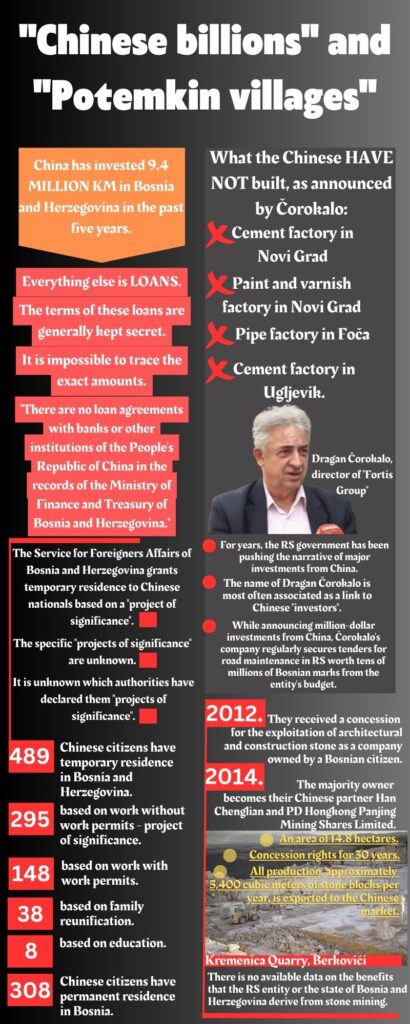Chinese "Potemkin Village"
The Chinese control the quarry in Berkovići, but they invested only about nine million BAM in five years in BiH
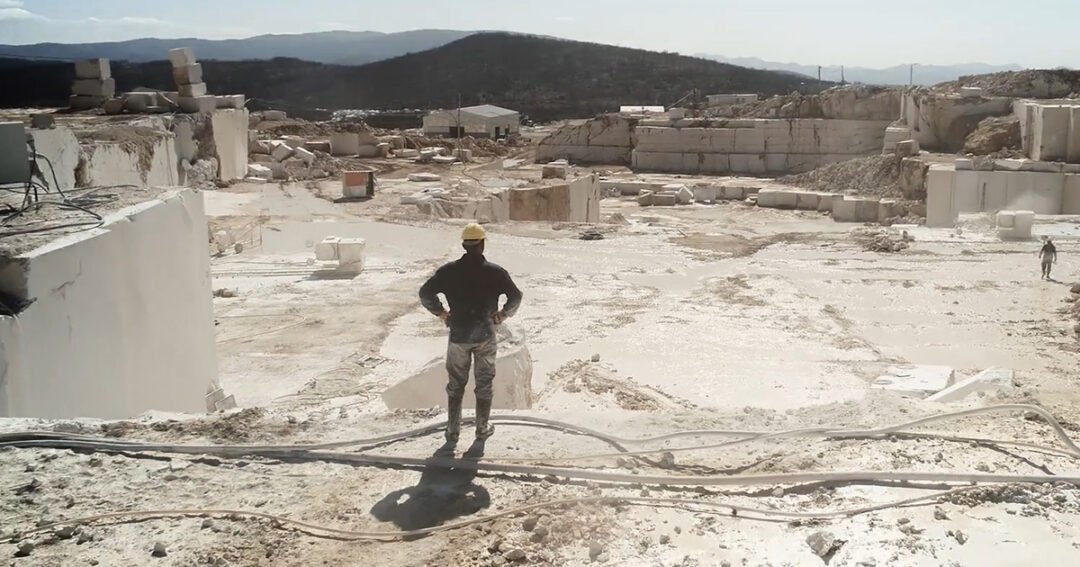
For years, Chinese investments have been announced in Bosnia and Herzegovina, but they have remained mere “empty words on paper” and are regularly “recycled.” This and other official data dismantle attempts to create an illusion that China is investing billions in Bosnia and Herzegovina. It is clear that there is a difference between Chinese loans shrouded in secrecy and actual investments in Bosnia and Herzegovina, which, when they do occur, result in taking ownership of our natural resources, such as quarries
The Kremnice Quarry in the municipality of Berkovići, within the Republika Srpska entity, has been managed by Chinese owners for years, and almost all the stone is exported to China. Although the company “Kremnice” obtained a concession for the exploitation of architectural and construction stone in the area of the Berkovići municipality in 2012 from the Government of Republika Srpska as a company owned by Bosnian citizens, in 2014, the majority ownership of the company was acquired by the Chinese partner Han Chenglian and the company Hongkong Panjing Mining Shares Limited. At that point, the concession for the Kremnice quarry, covering an area of 14.8 hectares, passed into the hands of the Chinese.
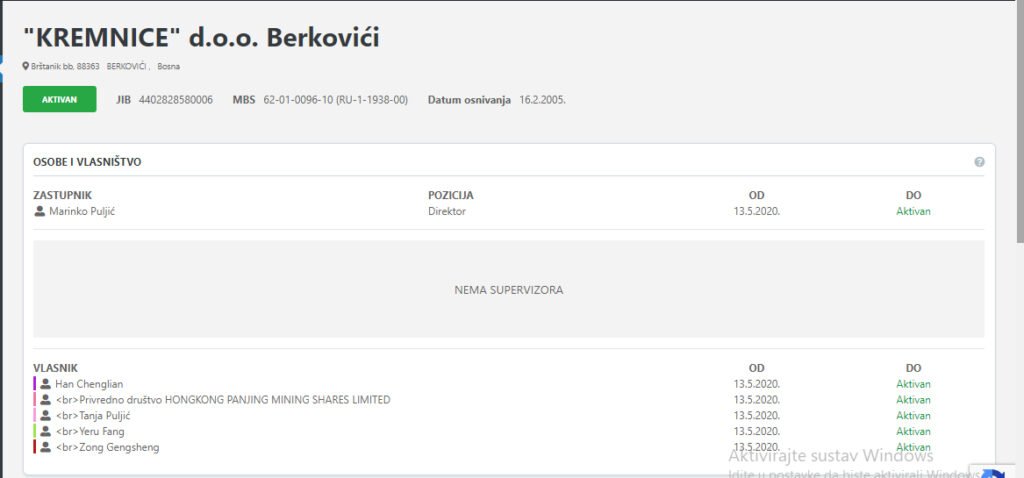
Written by: Fokus.ba/HercegovinaInfo
Since then, the entire production of stone blocks has been exported to the Chinese market. This will allow them to operate for the next 30 years, which is the duration of the concession rights. It involves an annual export of approximately 5,400 m3 of blocks, equivalent to 600 containers.
These are the data published by the company “Kremnica” on its official website. However, there is no information available regarding the benefits that the Republika Srpska entity or the country of Bosnia and Herzegovina gains from stone mining.
We have sent an inquiry about this matter to the relevant authorities in the Municipality of Berkovići, but we have not received a response.
In this context, it is indicative that according to the data from the Indirect Taxation Authority of Bosnia and Herzegovina, which Fokus obtained, the value of exported stone from our country has been around three million BAM for years, while stone imports can reach up to 26 million BAM in value.
Although a certain number of domestic workers are employed in the mine in Berkovići, it is clear that the Chinese have invested money in mining this valuable stone for their own benefit. Furthermore, more than half of the total value of architectural stone exports, including marble and granite, from Bosnia and Herzegovina in the last five years has been going to China.
While the exploitation of high-quality Herzegovinian stone benefits the Chinese the most in this case, such investments are classified as investments in Bosnia and Herzegovina, regardless of the fact that they are essentially the exploitation of our natural resources.
These alleged investments also expose the true intentions of both China and the promoters of their supposed good intentions in Bosnia and Herzegovina. Although there are occasional reports in our country about “Chinese billions” that have ended up in Bosnia and Herzegovina, many mistakenly interpret them as investments or direct investments. The information we received from the Foreign Investment Promotion Agency in response to our inquiry indicates that China has invested a total of 9.4 million BAM in Bosnia and Herzegovina in the last five years!
It is clear that this information dismantles attempts to create the illusion that billions of Chinese capital are being invested in Bosnia and Herzegovina.
Of course, there is a distinction between mysterious Chinese loans that finance certain projects in Bosnia and Herzegovina, especially in the Republika Srpska entity, and investments in the real sector that bring some benefits to Bosnia and its citizens.
Although FIPA (Foreign Investment Promotion Agency) states that despite the “modest amounts of registered capital from the People's Republic of China,” it should be noted that larger investments are realized through contracts for the construction and financing of energy and infrastructure projects in cooperation with partners from the People's Republic of China and public or private companies in Bosnia and Herzegovina. However, it must be emphasized that in these cases, it is not about investments but pure financing under conditions that Chinese financiers hide “like a snake's legs.”
Furthermore, FIPA cites the construction of the “Ivovik” Wind Farm near Livno as a significant Chinese investment, worth around 130 million euros. It is known that the Chinese obtained the concession for this project in a dubious manner, and the sale of electricity from this wind power plant will mostly benefit Chinese owners. Therefore, in this case, it cannot be considered an investment in Bosnia and Herzegovina but rather in private business interests.
SECRET PROJECTS OF NATIONAL SIGNIFICANCE THAT BENEFIT THE CHINESE AGAIN
The fact that Chinese loans and their contracts are secret and that there is no official data about them is evident from the response given to Fokus by the Ministry of Finance and Treasury of Bosnia and Herzegovina when asked about the country's indebtedness to Chinese banks.
“In the records of the Ministry of Finance and Treasury of Bosnia and Herzegovina, there are no credit borrowings from banks or other institutions of the People's Republic of China”, was the response from this state ministry to Fokus’ inquiry.
On the other hand, there have been previous attempts to obtain details of the contracts for Chinese loans that finance specific infrastructure projects in both the Federation of Bosnia and Herzegovina and the Republika Srpska. However, these details have remained secret to this day, so one can only speculate about the interest rates on these loans and the conditions under which they were obtained, which are assumed to be in favour of the Chinese creditors in any case.
SUSPICIOUS RESIDENCE PERMITS
At the same time, temporary residence permits are being issued to Chinese citizens based on “projects of significance” that they work on in our country without work permits.
When Fokus asked the Foreigners Service about these permits, they confirmed that a significant number of such permits have been issued recently. However, they did not respond to our inquiry regarding the specific “projects of significance.” It remains unclear which state authorities in Bosnia and Herzegovina, referred to by the Foreigners Service, have declared these projects as being of special interest, allowing Chinese citizens to obtain work permits in Bosnia and Herzegovina without prior approved residence permits.
Regarding your inquiry, we would like to inform you that there are currently 489 Chinese citizens with approved/extended temporary residence permits in Bosnia and Herzegovina. The majority of these permits were issued based on work without a work permit – projects of significance (295), work with a work permit (148), family reunification (38), and education (8). Additionally, 308 citizens of the People's Republic of China have been granted permanent residence permits in Bosnia and Herzegovina. Foreigners working on projects declared of special interest by state authorities can work without a work permit based on their previously approved residence permit. The Foreigners Service is responsible for approving residence permits based on projects of significance – stated the Foreigners Service to Fokus.
All these data contribute to the secrecy surrounding Chinese projects in Bosnia and Herzegovina, many of which are akin to “Potemkin villages.” Despite numerous announcements of investments over the years, only a few have been realized. However, it is evident that someone has an interest in creating the illusion of Chinese capital investment in our country.
However, the facts on the ground speak only of the influence and privileges enjoyed by the Chinese in obtaining concessions for natural resources in Bosnia and Herzegovina under suspicious circumstances, as well as the benefits reaped by Chinese investors through projects where they may have invested money, but it has been returned to them multiple times over.
It is interesting to see how attempts are being made to give credibility and legitimacy to alleged Chinese investments in Bosnia and Herzegovina through the institutions of the Republika Srpska entity.
For years, representatives of the Republika Srpska government have been meeting with various supposed investors from China and announcing the construction of factories throughout the entity, to be financed by Chinese businessmen. However, to date, all these announcements have remained mere words on paper.
FAILED PROJECTS HAVE BEEN RECYCLED FOR YEARS
One of the most frequently mentioned names associated with alleged Chinese investments is Dragan Čorokalo, the director of the “Fortis Group,” which comprises several companies, including “Prijedorputevi.”
Čorokalo is evidently responsible for “guiding” Chinese investors in Republika Srpska and disseminating information about their investments, which so far resemble nothing more than “Potemkin villages”, as none of these projects have materialized.
Back in 2016, Čorokalo announced a joint investment with the Chinese in a cement plant in Novi Grad, where the Chinese would have majority ownership.
Although Čorokalo previously claimed that the finalization of this agreement was just a matter of days, today, eight years later, there is nothing left of this project, which was said to be worth 120 million euros and would employ around 500 workers.
Čorokalo had announced that he would request the Republika Srpska to declare this deal with the Chinese as a project of general interest. It raises the question of whether it is based on the declaration of such nonexistent projects that hundreds of Chinese citizens are granted the supposed right to work in Bosnia and Herzegovina without prior residence.
Čorokalo had announced the construction of the cement plant with the Chinese company “CAMCE”, and a few years later, the director of the “Fortis Group” announced the construction of a paint and varnish factory, also in Novi Grad, again with the Chinese company Golden Fish Color Company from Beijing.
Neither of these factories were ever built.
In the meantime, Čorokalo has returned to empty promises of building a cement plant in Novi Grad, this time with the company Power of China. Two years ago, discussions were held about this project with the Prime Minister of Republika Srpska, Radovan Višković, who expressed support for the project.
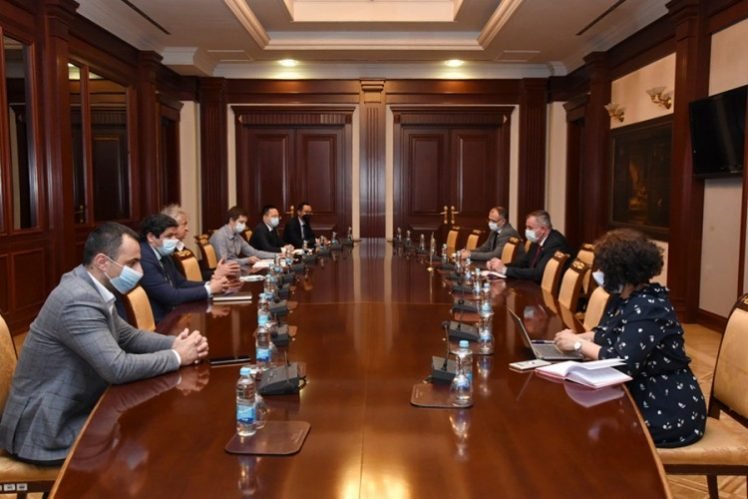
To this day, nothing has materialized from this factory either. The announced construction of a pipe factory in Foča or a cement factory in Ugljevik, which were also discussed for years at the level of government institutions in Republika Srpska, did not come to fruition.
However, it is evident that Čorokalo benefited from “managing” the Chinese and empty talks about their alleged investments. It is revealed that while he announced investments from China, his company consistently won tenders for road maintenance in Republika Srpska worth tens of millions of convertible marks from the entity's budget, as reported by Žurnal on multiple occasions.
The operations of Chinese companies registered in the Federation of Bosnia and Herzegovina also carry an invisible mark of secrecy.
When Dragon Maritime SEE d.o.o, representing the Chinese shipping company Cosco Shipping, opened its office in Sarajevo in 2018, improvements in services were announced, particularly in terms of faster and higher-quality transportation for importers and exporters.
However, the official business registers list the company's activity as “market research and public opinion.” Apart from the information that Meliha Mujezinović is the representative of the company and the address of its headquarters in Sarajevo, no other data about it is available.
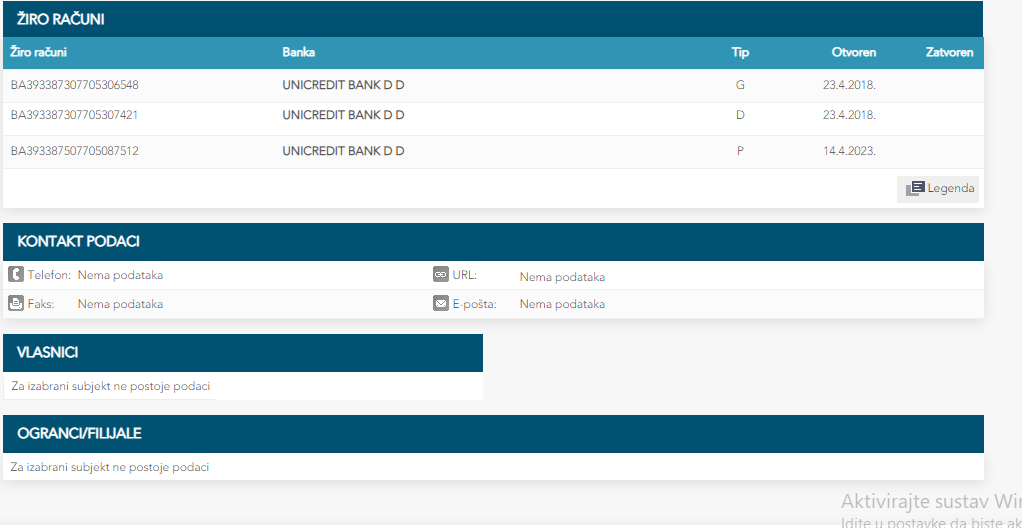
Today, almost five years later, the public in Bosnia and Herzegovina is not aware of any progress made in that regard, or what benefits primarily Bosnian exporters have gained from this company.
We have sent numerous inquiries about their operations to the address of this company, but we have not received a response.
VTKBIH HAS NO INFORMATION ABOUT THE CHINESE REPRESENTATION IN SARAJEVO
Interestingly, even the Foreign Trade Chamber of Bosnia and Herzegovina, the institution that serves as the main link between domestic businesses and foreign counterparts, has no data on this Chinese company.
“Colleagues from different sectors have checked our databases regarding Dragon Maritime SEE d.o.o. – Representation in Bosnia and Herzegovina, and unfortunately, we cannot provide much assistance. Dragon Maritime SEE d.o.o. – Representation in Bosnia and Herzegovina participated in the workshop ‘Responsibility of Carriers in Multimodal Transport’ in December 2022, organized by VTKBiH. We do not have any other information about this company,” stated the Foreign Trade Chamber of Bosnia and Herzegovina in response to Fokus's inquiry.
Recently, the FBiH Railways were mentioned as partners of Dragon Maritime SEE d.o.o. in the opening of a new intermodal service called Land Sea Express Tuzla, which includes regular maritime transportation of goods to the port in Rijeka, Croatia, and an intermodal connection via rail transport to the final destination in Tuzla. Therefore, we sought a response from FBiH Railways regarding the scope of this project and their cooperation with the Chinese company.
This railway line was announced as a “response to the high market demand and as a complement to the existing services of Cosco Shipping in the Bosnian market.”
Regarding the specific question of whether FBiH Railways cooperate with the Chinese company Cosco Shipping, or the firm Dragon Maritime SEE d.o.o, and to provide more information about the implementation of the project to establish railway traffic for the needs of the Chinese company, FBiH Railways responded:
“With the opening of a container terminal in Tuzla, FBiH Railways, in line with their capabilities and in cooperation with participating partner railways, have provided an offer of conditions and transport prices for complete container trains from the Port of Rijeka to this terminal to all interested users. Based on the expressed interest, this offer has been expanded to include railway transport between the Tuzla and Surčin container terminals. Through contractual cooperation with COSCO SHIPPING LINES, specifically their agent for maritime and intermodal transport, DRAGON Maritime SEE, we initiated the transportation of container trains on this route at the end of last year and the beginning of this year, and during that period, we handled a total volume of 152 containers. The continuation and further development of this project are entirely dependent on the decision and choice of users,” stated FBiH Railways to Fokus. However, this response does not indicate the extent of benefits for domestic and Chinese businesses from this line.
What is clear from these few examples is that under the guise of alleged investors, particularly in the RS entity, Chinese negotiators frequently arrive and make empty promises that are enthusiastically supported by representatives of the authorities in RS, even though it is evident that these promises have long become “false hopes.”
